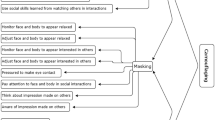Abstract
This study examined the humor used by a group of autistic adults. Subjects were nine autistic adults who were participating in a Social Skills Group. The jokes they told during a designated joke time over 15 consecutive group sessions were analyzed according to their developmental levels. The participants told a total of 87 unique jokes, almost all of which were riddles. The most common types were preriddles and those having lexical and phonological ambiguity. Along with empirically examining the jokes used by this group of high level autistic adults, the study demonstrates that they enjoy a wide range of jokes and that humor seems to enrich their lives.
Similar content being viewed by others
References
Bowes, J. (1981a). Developmental changes in the structural complexity of children's riddles.Current Psychological Research, 1, 129–137.
Bowes, J. (1981b). Some cognitive and social correlates of children's fluency in riddle-telling.Current Psychological Research, 1, 9–19.
Creak, E. M. (1963). Childhood psychosis: A review of 100 cases.British Journal of Psychiatry, 109, pp 84–89.
Everard, M. P. (1976, July).Mildly autistic young people and their problems. Paper presented at the International Symposium on Autism, St. Gallen, Switzerland.
Garfin, D. G., & Lord, C. (1986). Communication as a social problem in autism. In E. Schopler & G. B. Mesibov (Eds.),Social behavior in autism (pp. 133–150). New York: Plenum Press.
Hogan, D. (1981). Learning to tell jokes: A case study of meta linguistic abilities.Journal of Child Language, 8, 217–224.
Kanner, L. (1943). Autistic disturbance of affective contact.Nervous Child, 2, 217–250.
McGhee, P. E. (1979).Humor: It's origin and development. San Francisco: W. H. Freeman.
Mesibov, G. B. (1984). Social skills training with verbal autistic adolescents and adults: A program model.Journal of Autism and Developmental Disorders, 14, 395–404.
Mesibov, G. B. (1986). A cognitive program for teaching social behaviors to verbal autistic adolescents and adults. In E. Schopler & G. B. Mesibov (Eds.),Social behavior in autism (pp. 265–283). New York: Plenum Press.
Ricks, D. M., & Wing, L. (1975). Language, communication, and the use of symbols in normal and autistic children.Journal of Autism and Childhood Schizophrenia, 5, 191–221.
Ritvo, E. R., & Freeman, B. J. (1978). National society for autistic children definition of autism.Journal of Autism and Developmental Disorders, 8, 162–167.
Rutter, M. (1978). On confusion in the diagnosis of autism.Journal of Autism and Childhood Schizophrenia, 8, 137–161.
Rutter, M. (1983). Cognitive deficits in the pathogenesis of autism.Journal of Child Psychology and Psychiatry, 24, 513–531.
Rutter, M., & Schopler, E. (Eds.). (1978).Autism: A reappraisal of concepts and treatment. New York: Plenum Press.
Schopler, E., & Mesibov, G. B. (Eds.). (1986).Social behavior in autism. New York: Plenum Press.
Schopler, E., Reichler, R. J., DeVellis, R. F., & Daly, K. (1980). Toward objective classification of childhood autism: Childhood autism rating scale (CARS).Journal of Autism and Developmental Disorders, 10, 91–103.
Schultz, T. R. (1974). Development of the appreciation of riddles.Child Development, 45, 100–105.
Schultz, T. R., & Pilon, R. (1973). Development of the ability to detect linguistic ambiguity.Child Development, 44, 728–733.
Whitt, J. K. & Prentice, N. M. (1977). Cognitive processes in the development of children's enjoyment and comprehension of joking riddles.Developmental Psychology, 13, 129–136.
Author information
Authors and Affiliations
Rights and permissions
About this article
Cite this article
Van Bourgondien, M.E., Mesibov, G.B. Humor in high-functioning autistic adults. J Autism Dev Disord 17, 417–424 (1987). https://doi.org/10.1007/BF01487070
Issue Date:
DOI: https://doi.org/10.1007/BF01487070




